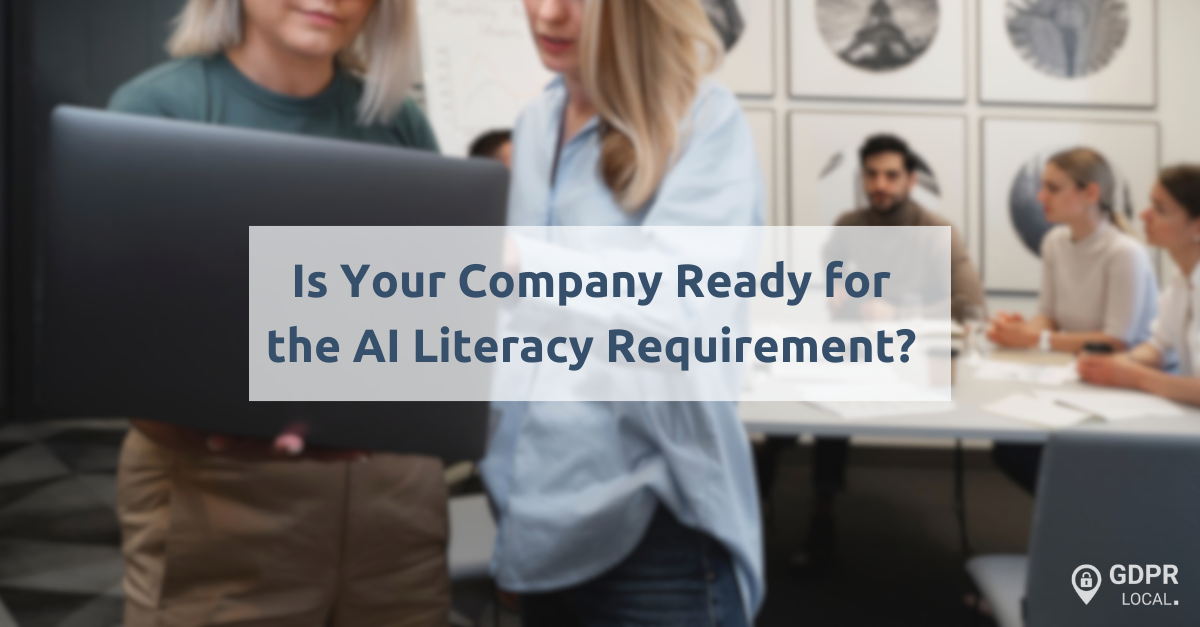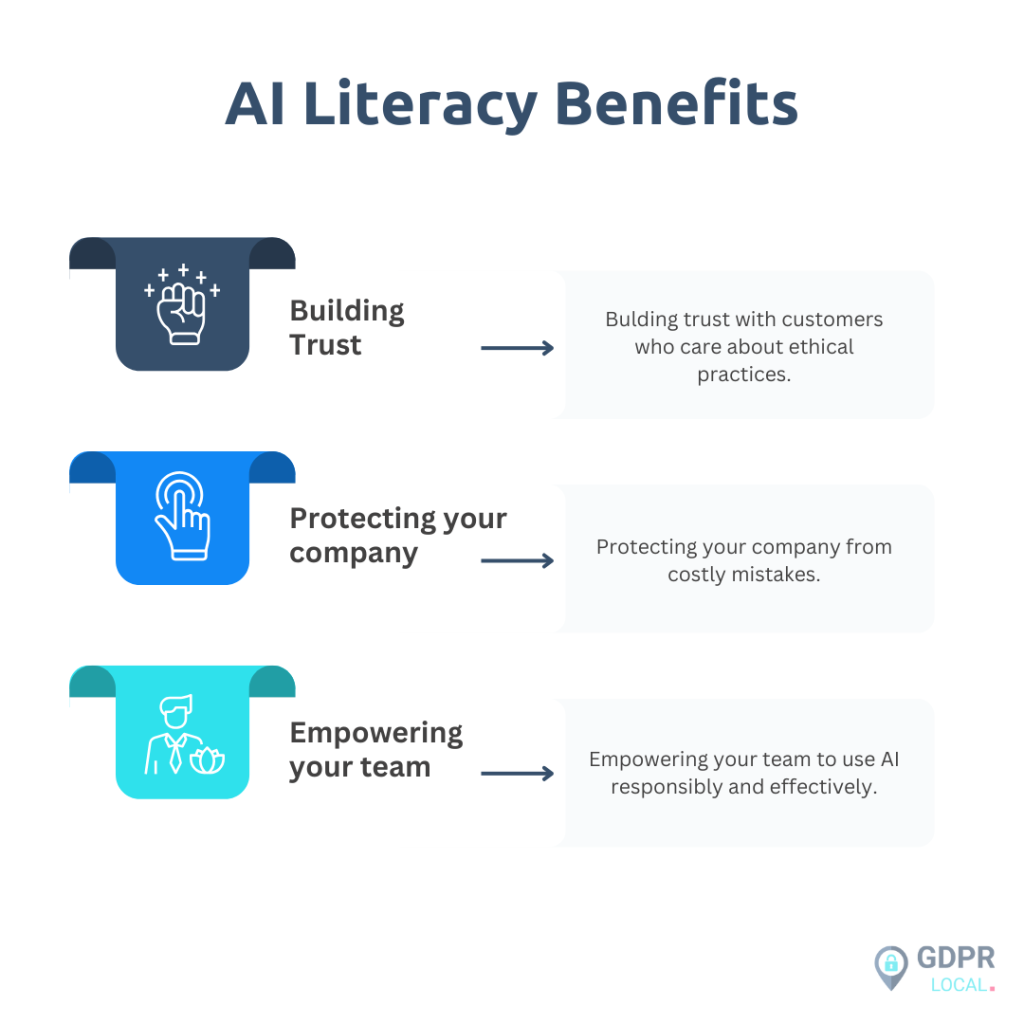
Is Your Company Ready for the AI Literacy Requirement?
In our previous blog – Understanding EU AI Act Literacy Requirement: Getting Ready for the EU AI Act in Its First 6 Months, we explored the phased approach of the EU AI Act and its key milestones, emphasizing the importance of AI literacy as the foundation for responsible AI use. With February 2, 2025, marking the start of provisions related to AI literacy, the focus shifts from understanding the timeline to taking actionable steps.
This brings us to today’s blog: how your company can prepare for the AI literacy requirement in practical, meaningful ways. It’s not just about compliance – it’s about encouraging your team to operate AI confidently, avoid risks, and seize new opportunities. If the first part provided the “why” and “when,” this part dives into the “how,” ensuring your workforce is ready to meet the demands of this new era of AI governance.
With just one month to go before the AI literacy requirements of the EU AI Act kicks in, it’s time to ask an important question: Does your team truly understand AI?
This isn’t about turning everyone into tech experts. AI literacy is about giving your people the tools and knowledge they need to understand how AI works, what it can (and can’t) do, and the impact it has on their work and your business.
Starting from February 2, 2025, this knowledge won’t just be nice to have – it’ll be a legal obligation.
Let’s break it down.
What Does AI Literacy Really Mean?
AI literacy is simply about understanding the basics of AI and how it fits into the bigger picture. It’s not rocket science but it needs some specific understanding.
For companies, AI literacy means ensuring that everyone – from your developers to your customer service reps – has a basic understanding of:
• How AI works: What makes it tick and what kinds of decisions it can (and can’t) make.
• The risks involved: From bias in algorithms to data security concerns.
• Ethical considerations: What does “doing the right thing” look like when it comes to AI?
• Regulatory requirements: What are your responsibilities under the AI Act?
Expanding on AI Literacy: Meeting the AI Act’s Requirements
As outlined in Article 4 of the EU AI Act, businesses developing or deploying AI systems are obligated to ensure their staff and other stakeholders possess a “sufficient level of AI literacy.” This requirement is context-specific, accounting for the individual’s technical knowledge, education, and experience, as well as the AI system’s application.
At its core, AI literacy bridges the gap between complex AI technologies and everyday decision-making, empowering individuals to use AI effectively and responsibly. For example, developers should understand algorithmic nuances and risk mitigation techniques, while end-users, such as educators deploying AI in classrooms, need awareness of how AI might influence teaching methodologies, privacy, and fairness.
Moreover, AI literacy extends beyond basic comprehension to specialized knowledge in areas like ethical oversight and human-AI collaboration. This is particularly critical for high-risk AI systems, where staff must be trained to recognize automation biases, interpret outcomes accurately, and maintain transparency. Such comprehensive training ensures that stakeholders can navigate ethical challenges, regulatory demands, and technical complexities effectively.
As the AI Act unfolds, companies must adopt a proactive stance, integrating AI literacy initiatives with broader governance and risk management frameworks. By aligning with international best practices and leveraging tools developed by the European Artificial Intelligence Board and AI Office, businesses can create a workforce ready to meet the Act’s stringent requirements while fostering trust and innovation.
Why Does It Matter?
Imagine this: Your marketing team starts using an AI tool to analyze customer behaviour and suggest personalized ads. But they don’t realize the tool is biased – it suggests different offers based on race or gender. Not only could this hurt your reputation, but under the new AI Act, it could also lead to serious fines.
By investing in AI literacy, you’re not just ticking a box to meet legal requirements. You are building trust, protection your company and empowering your team.

What Should You Do Right Now?
The good news? You don’t need to reinvent the wheel. Preparing for AI literacy can be straightforward if you start now. Here’s how:
Get Everyone on the Same Page
Start with the basics. Host a company-wide meeting or workshop to explain:
• What the AI Act is.
• Why AI literacy matters.
• How it affects your business.
Keep it simple and open the floor for questions. This isn’t about overwhelming people—it’s about helping them feel informed and involved.
Offer Training That’s Practical
Nobody wants to sit through a boring lecture. Make your training sessions interactive and relatable. Use real-life examples of how AI is already being used in your industry. Break down technical concepts into everyday language.
For example, instead of explaining “algorithmic bias,” show how an AI tool might mistakenly suggest job ads to men more than women.
Create Easy-to-Use Resources
Not everyone learns the same way, so offer different formats:
• Short videos or podcasts.
• Quick-read guides or infographics.
• Hands-on practice with AI tools.
The key is to make it accessible and engaging.
Encourage a Culture of Curiosity
Make it okay to ask questions or admit when something isn’t clear. The more your team feels comfortable discussing AI, the better equipped they’ll be to handle challenges and spot potential issues.
What Happens If You Don’t Prepare?
From February, non-compliance could mean fines reaching up to €35 million or 7% of a company’s global annual turnover, whichever is higher, for severe violations, but also an operational headache, or even losing customer trust.
But this isn’t just about avoiding penalties. It’s about staying competitive. Companies that embrace AI literacy will be better positioned to innovate, adapt, and grow in the AI-driven world.
Conclusion
The AI literacy requirement is coming fast, but it doesn’t have to be stressful. Think of it as an opportunity to future-proof your business and empower your team.
Start small, take it step by step, and remember: The goal isn’t perfection – it’s progress.
By February 2, 2025, make sure your company is ready to show the world that you take AI literacy (and your responsibilities) seriously. Your team, your customers, and your business will thank you.
Our GDPRLocal AI team has come up with an effective and straight-forward way to deal with the AI Literacy requirement. Contact us at [email protected] and find out how we can help you.